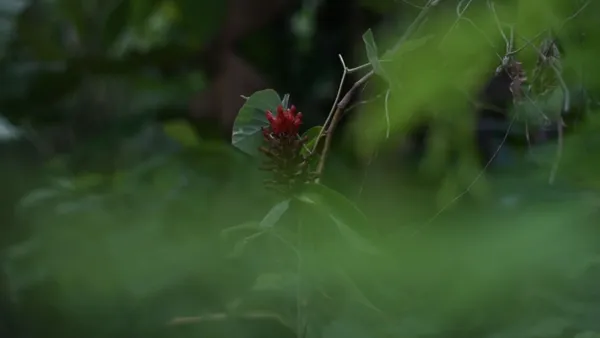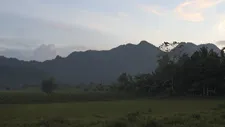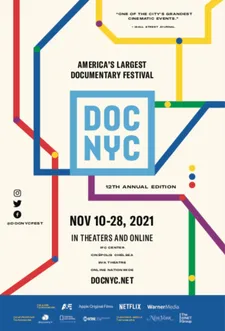 |
| Kim Maxime Baglieri on In Order To Escort Her: “I wanted to work on a story that would be healing for everyone, or at least help bridge the cultural divides in family alone.” |
In the third in a series of DOC NYC conversations with filmmakers from the Hunter College MFA Program in Integrated Media Arts (see Neville Elder on his Anamnesis [Part One] and Lidiya Kan on Morkovcha (Korean Carrot Salad)), I discussed with Kim Maxime Baglieri the influence of Aleph director Iva Radivojevic, Michael Gitlin, Apichatpong Weerasethakul, Kidlat Tahimik, and Richard Kelly’s Donnie Darko, the impact of migration and family separation, generational storytelling, resilience, hope and magic, belief in the supernatural, the malunggay plant, and the mysterious nature of her title In Order To Escort Her. Kim brought up that she watched Brett Morgen’s documentary Jane on Jane Goodall while in the process of making her film.
 |
| Kim Maxime Baglieri with Anne-Katrin Titze: “I love Kidlat Tahimik, Apichatpong Weerasethakul.” |
1942 - the Philippines. “I’m still 17,” says a voice that is clearly of the 21st century. The past and the future disappear into a verdant present. Plant life takes control. Colours waver between peach and mauve; a tomato is being cut next to a pink towel. This is a film of textures and tastes where ghosts are as real as you or I.
From Brooklyn, Kim Baglieri joined me on Zoom for an in-depth conversation on In Order To Escort Her.
Anne-Katrin Titze: Before we talk about your beautiful film, I’m curious about filmmakers that inspire you.
Kim Maxime Baglieri: I love Kidlat Tahimik, Apichatpong Weerasethakul.
AKT: I actually was thinking about Apichatpong Weerasethakul while watching your film.
KMB: Oh really? Yeah, I’ve definitely definitely been inspired by his work. I love Donnie Darko, the movie. One of the women that went to my [Hunter College MFA Integrated Media Arts] program, Iva Radivojevic, I’m so inspired by her work. I love Michael Gitlin’s work from our program too. I draw inspiration from a wide range, from musicians to filmmakers to visual artists and video artists.
AKT: Iva had her film Aleph in New Directors/New Films. I talked with her about it, it’s a fantastic film.
KMB: Yeah, it’s a marvellous film. While I was making my film, I was watching the documentary about Jane Goodall. Have you seen it?
AKT: Yes, and I had the chance to talk with her about it, too.
KMB: Movies that break the linear structure I’m really inspired by. Her movie also just keeps surprising you.
 |
| Kim Maxime Baglieri: “I think the journey of the film is sort of partnered by my own spiritual journey in terms of trusting my own sense of intuition and guidance.” |
AKT: The title of your film surprised me. In Order To Escort Her is very mysterious. Do you want to talk about the title or keep it mysterious?
KMB: That’s a good question. I think I would rather keep it mysterious.
AKT: In my intensive writing course at Hunter on fairy tales and storytelling, I ask all my students to present to us a folktale that reflects their cultural heritage, however they may define that.
KMB: Oh cool.
AKT: Many of the narrations from the Philippines are ghost stories. Did you learn anything new about ghosts? Did your relationship to ghosts change while making the film?
KMB: Yeah, it did. I mean you don’t really know what happens after you pass away. I’ve had one or two experiences in that realm that were very feeling-based. I think the journey of the film is sort of partnered by my own spiritual journey in terms of trusting my own sense of intuition and guidance. When I was doing the interviews, my mom was a big part of the filmmaking process. In the editing process I saw the stories of certain family members almost in a new way. It hit me in a new way. If I were more confident in my own experiences with energy - it was a kind of affirmation of trusting my own sense of not ghosts, but energies.
AKT: It can be difficult in Brooklyn to connect to the energies of the original inhabitants, whom you give a shout out to in the credits. I liked that. You might not feel spirits surrounding you as much while going to the corner deli, than you would if there were ferns and trees all around you.
 |
| Kim Maxime Baglieri: “When Pilar, my great-aunt, told me all of her stories and I couldn’t record all of them, I put them into the voiceover.” |
KMB: Exactly. That’s so true. It is very hard. In Brooklyn or any fast-paced place.
AKT: How did the decision to tell the story in voiceover come about? It’s your voice, yes?
KMB: It’s my voice. With my grandmother before she died, I kind of sensed it. I was living in L.A. and I knew I had to go to New York and I missed her. In 2011, I visited my grandma’s sister in the Philippines with whom I’ve had a close relationship. I knew I had to go and record her story. The writing is adapted; it’s 90% accurate and 10% imagined. A lot of the things she said I wasn’t able to record. The audio was pretty terrible.
For years I thought how do I use this? Pilar and Lila, as you see in the film, were very close. When I visited them in 2011 they had this ongoing debate about that place. It was a cute debate because they couldn’t agree on what the name was, Malibago or Balibago. Lila is Pilar’s brother’s wife, but they’ve all been friends since they were children and grew up on the same street. When Pilar, my great-aunt, told me all of her stories and I couldn’t record all of them, I put them into the voiceover.
AKT: Pilar’s text from 1942 is part of the narrative.
KMB: Pilar is a very captivating imaginative woman and she passed away in 2012. Her story was of the man peering through the thatched roof and also when they were in shorts and catching shrimp.
 |
| DOC NYC 2021 poster |
AKT: What made it clear to you that you wanted to tell their story? Was there a fern that started to unravel?
KMB: I wanted to pay homage to my great-aunt who was a beautiful person who maybe wasn’t in the right culture at the right time. She had a deep belief in the supernatural, she was kind of magic, I don’t know how to put it. I wanted to work on a story that would be healing for everyone, or at least help bridge the cultural divides in family alone. I wanted to tell a story about their experience as young people that alludes to the impact of migration and family separation. It’s also about resilience or hope or magic at the end. Just being your 100% magical completely authentic older self.
AKT: Resilience and magic go together well. I particularly like the moment about favourite plants. The second one is the fern, the third is the wild orchid. I forgot the first one. Then comes the sentence “To be honest, it’s not really in any specific order.” That’s lovely. What was the first one?
KMB: Malunggay, it’s a plant in the Philippines. It’s not like I’m an expert, my great-aunt was a gardener and she planted stuff. It’s also alluding to the state of the world and how horrible things can be but it’s like you still have to be an artist, you have to still be a gardener. You still have to bring your sense of joy.
AKT: You definitely show that sense of joy!
KMB: Thank you so much for reaching out! This was lovely and I’m really grateful and I’m glad you liked the film. Talk to you soon!
DOC NYC 2021 in cinemas (IFC Center - SVA Theatre - Cinépolis Chelsea) ran from November 10 through November 18. Select films are screening online in the US from November 19 through November 28.
























